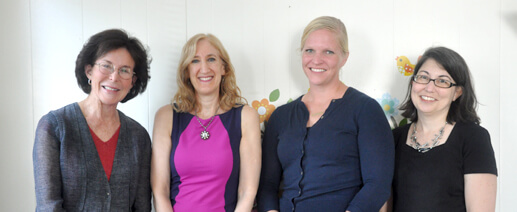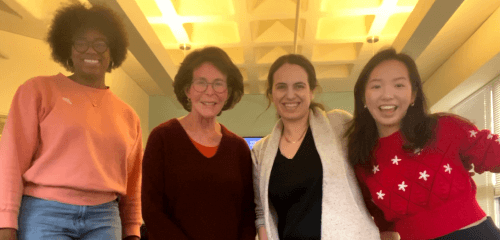
The Biobehavioral Family Studies Lab, under the direction of Dr. Karlen Lyons-Ruth, PhD, Professor of Psychology at Harvard Medical School, is conducting translational research to better understand the contributions of early relational risk, trauma, and genetic factors to social adaptation and early brain development in infancy, childhood, and adolescence.
Research conducted in the lab has pursued three important questions. One research component, the Family Pathways Project, has examined the longitudinal prediction from environmental risk factors assessed in infancy to later maladaptation in infancy, childhood, adolescence, and adulthood. A second component has assessed the impact of early supportive interventions in altering these risk-related trajectories. The third major research component, the Mother-Infant Neurobiological Development (MIND) study, is examining the mechanisms through the mother's history of childhood maltreatment is transmitted to her offspring over the first two years of life, including effects on infant behavior and brain development.
The NIMH-funded Family Pathways Project is one of the few long-term prospective longitudinal studies of infants from adverse environments. Results emerging from this 30-year longitudinal study are that infant disorganized attachment behavior and disrupted communication on the part of the parent in the first two years of life have long-term implications for depression, suicidality, borderline psychopathology and antisocial behavior into young adulthood, even with subsequent risk factors controlled. These results have been replicated and raise the possibility of an early sensitive period for the development of effective emotion regulation capacities.
 Providing supportive intervention services to families at risk due to poverty and maternal depression was also found to alter the quality of interaction so that early infant outcomes were significantly improved in the intervention group. These positive outcomes associated with the provision of early support to 18 months of age were sustained through school entry.
Providing supportive intervention services to families at risk due to poverty and maternal depression was also found to alter the quality of interaction so that early infant outcomes were significantly improved in the intervention group. These positive outcomes associated with the provision of early support to 18 months of age were sustained through school entry.
Our third research direction was initiated by funding from Harvard Catalyst to work with Dr. Martin Teicher's neuroscience lab at McLean Hospital to assess the association between early risk experiences in the first two years of life and later amygdala and hippocampal volumes in adulthood. The significant results found in that work, pointing to potential effects of early experience on adult limbic volumes, led to our third focus. The Mother-Infant Neurobiological Development (MIND) study is a multi-site study funded by NICHD to assess the mechanisms involved in the intergenerational transmission of altered neurobiology from mother to infant. Dr. Lyons-Ruth and her Co-PI's, Dr. Martin Teicher, McLean Hospital, and Dr. Ellen Grant, Children's Hospital, are currently evaluating the relations between infant brain development and a number of potential mechanisms that may mediate risk transmission. These risk factors, on the maternal side, include the mother's brain morphology, history of childhood maltreatment, stress hormones, and her disrupted communication with her infant. On the infant side, mechanisms of transmission being investigated include infant stress responses to a mild lab challenge, infant engagement in early interactions, and infant security of attachment at one year. Finally, epigenetic alterations associated with these risk factors will be investigated for both mother and infant under separate NICHD funding. Alterations in infant T1 brain volumes and DWI-assessed white matter tract integrity, as well as functional connectivity, are being assessed in relation to both maternal and infant risk mechanisms.
More than 150 publications have resulted from this work, including seminal review chapters on Disorganized Attachment in the Cassidy and Shaver's Handbook of Attachment, 1st, 2nd, and 3rd Editions, and on Risk for Disorder in Infancy in Mash and Barkley's influential textbook, Child Psychopathology, 1st, 2nd, and 3rd Editions. The Biobehavioral Family Studies Lab also trains researchers internationally in coding assessments developed in our lab, including the AMBIANCE assessment for atypical forms of parent-infant interaction and the RISE scale for assessing indiscriminate infant attachment behavior.